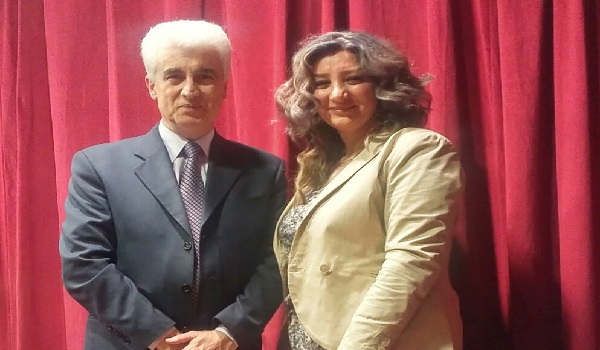Damascus,(ST)-The monthly symposium at the Arabic Cultural Center Abu-Roumana “A Writer and a Stance” on poetry and criticism, was marked this month by the poet and critic Dr. Thaer Zeinedine Tuesday evening, April 9, in the presence of Mr. Malik Sakour, head of the Arab Writers Union, Ms. Rabab Ahmed, Director of the Cultural Center, and some members of the executive office of the Union, a number of writers, poets and critics, and a gathering of interested persons in culture and media.
Professor Abdul Rahman Al-Halabi, who conducted the symposium which addressed the critical and poetic output of the poet and critic Zinedine, sailed through a collection of poems and critical ideas of the poet’s output.
In his response to the question of the influence of plastic art in literature, the poet Zeinedine clarified that he has followed up in his book, “the wild light of the lamp/ the relationship between poetry and plastic art”, the impact of plastic art on poetry and how this is shown in the poems of some poets who have been inspired by paintings and statues. Dr. Zeinedine cited examples of the influence of the statue of Venus and Aphrodite on hundreds of world poets, the influence of the Kagura temple on Omar Abu Risha and others. Other poets were themselves visual artists writing with the sensitivity of an artist.
In regards of Dr. Zeinedine book “Transformations of the Lost Linden” which treats the impact of plastic art in the novel, to the point of building a novel on art works.
A number of poets were inspired by heritage characters or texts, to be employed in their literature. The critic Zeinedine pointed out that he approached this subject in some of his books such as “Abu al -Tayeb al-Mutanabi in Arabic Contemporary poetry”, and “Mirrors of coming shadows”, stressing that these characters or events if they were not powerful enough, they could not have been able to extend their ‘necks’ to later periods beyond their times and ages.
Regarding creative experiences produced in oppressive atmospheres, Dr. Zeinedine declared that experience has proven that oppression of any kind, whether political, social, or religious; can’t extinguish the flame of creativity. He demonstrated the example of the Russian writer Bulgakov, and some ancient Arabic literature experiences.
As for the prose poem style, the poet explained that he did not write poetry in the form of prose not as an attitude from it, but because he found in himself a tendency to write aphoristic verses.
The symposium was interposed by views of a number of poets, writers and critics in regards of the experience of the poet and critic Thaer Zeinedine.
In conclusion, Dr. Zeinedine poetic language was characterized by sweetness and simplicity, a vibrant living language, warm and deep, moving from legendary to reality taking the reader to a wavy journey toward the magical world of poetry.
Lama Alhassanieh

